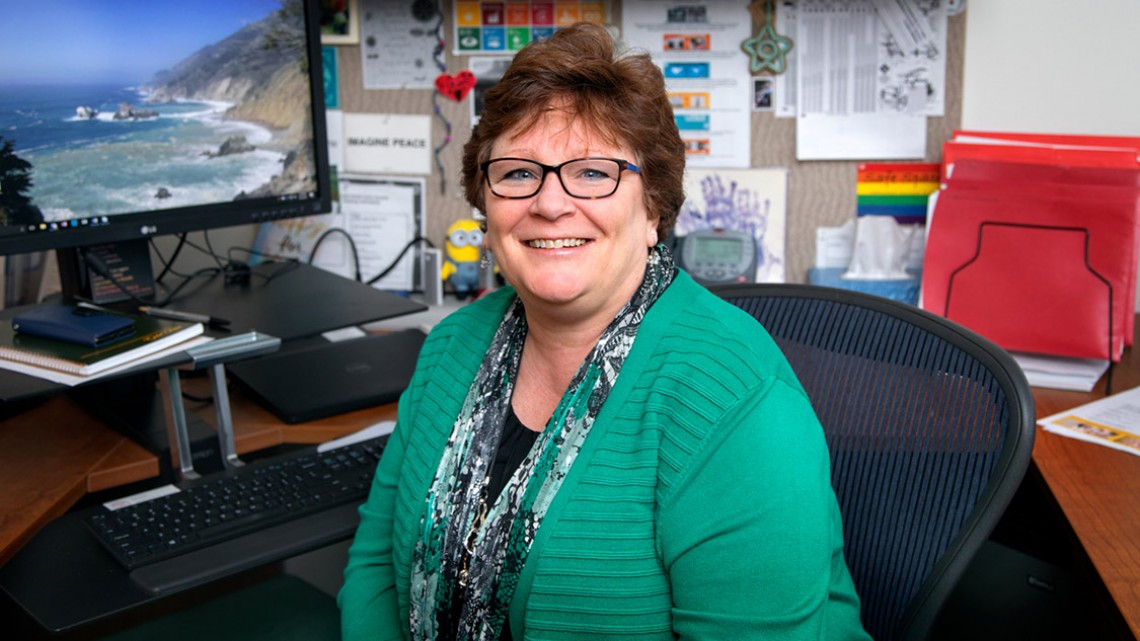
Diane Bradac, work/life consultant.
Diane Bradac helps employees manage work/life challenges
By Ashley Fazio
Ask Diane Bradac about her position as work/life consultant in human resources, and she speaks passionately about supporting Cornell employees and creating a workplace in which self-care is not only possible, but a priority.
“We know that some of our employees are facing high levels of stress, as they juggle their career and family obligations. Some are navigating complicated health and financial decisions, while others face issues related to extended family needs,” Bradac says. “They are often in situations where everything they are doing is important, and they want to know what they can do to better manage it all.”
Bradac has been in Work/Life at Cornell for about a year. Her role is twofold: to meet one-on-one with faculty, staff and retirees to provide guidance and resources, and to develop events and programming to address needs identified in the workforce.
In both roles, she helps individuals examine how variables in their lives – career goals, life transitions, health concerns, dependent care responsibilities, for instance – influence, and sometimes collide with, each other. “Managing how it all comes together involves regularly assessing our short- and long-term needs and desires,” she says. “Self-awareness, flexibility and connecting with campus and community resources is key.”
In the past year, Bradac and the Work/Life team have offered more than 40 workshops and lectures on topics such as parenting, workplace flexibility, life transitions and elder care.
“About half of our employees’ children enrolled on Cornell health plans are currently between the ages of 5 and 18, so we added several new programs in the past year focused on teens and tweens, including helping parents and their kids manage cell phone usage, understanding adolescent gender and sexuality dynamics, and a series about preparing for college,” Bradac notes.
To support elder/adult caregivers – identified as a high source of stress for staff and faculty in the 2016 Employee Survey – Bradac facilitates a Caregiver Support and Education Network that meets monthly. Participants learn from each other by sharing strategies and tools for coping with stress, caregiver guilt and burnout, as well as information on local and national resources.
Bradac and the Work/Life team have also stepped up efforts to address less visible issues affecting employees and retirees. Through programming and communications, they have focused on issues such as sleep disorders, personal health and financial challenges, emotional preparedness for retirement, and increasing awareness of support for victims of domestic violence.
Bradac works closely with other human resource offices, Cornell Wellness, the Faculty and Staff Assistance Program, and departments that address diversity and accessibility. She also partners with – and connects employees to – such community agencies as the Cancer Resource Center of the Finger Lakes, the Finger Lakes Independence Center, Tompkins County’s Child Development Council, and Office for the Aging. Her previous work as director of the Tompkins Workforce New York Career Center – a partnership of 11 local agencies that helps clients with educational, career and professional development – provides a solid foundation for Bradac’s current work in helping to guide individuals to resources and identifying ways to move toward a more manageable state of well-being.
“I meet employees at the highest and lowest moments in their life – they’re preparing for the arrival of a new baby, a child going off to college or struggling to find care for a loved one diagnosed with Alzheimer’s,” Bradac says. “I have a unique opportunity in those moments to provide support and reinforce that their employer cares about them – not only as a worker but as a person.”
She continues, “We want our employees to know that they belong to a caring community. Cornell is committed to providing the programs and policies they need to care for themselves and their loved ones.”
In the past year the Work/Life team has begun providing a remote option for most events and workshops. The alternative has boosted participation by faculty, staff and retirees who could not otherwise attend. “It’s important to us that we are inclusive, accessible and sensitive to all members of our community,” she says.
“I love helping employees explore what it means to live the life they want,” Bradac says. “Each person’s journey is unique and constantly evolving. It’s an honor to help them along the way.”
Employees and retirees are encouraged to contact Bradac and the Work/Life team by email or phone, 607-255-0388, to find out about educational workshops, training on flexible work arrangements, lactation accommodations, self-care and navigating health concerns.
All Work/Life programs can be found on the Work/Life website, Wellbeing and Perks.
Ashley Fazio is director of communications for the Division of Human Resources.
Media Contact
Get Cornell news delivered right to your inbox.
Subscribe
